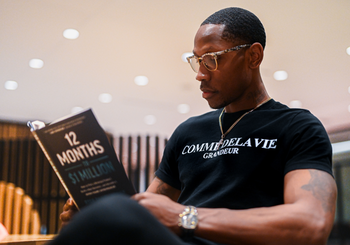In This Story
“I wanted to start my own business,” says Patcharaporn Adchariyavivit, a Costello MBA student, “It seemed like this course was going to help me start it. But I didn’t expect it be this good, you know?”

Skip West, founder of MAXSA Innovations and adjunct faculty at the Costello College of Business at George Mason University, offers the course Turning Ideas into Successful Companies once a year to MBA students. The concept for the course came from West’s own entrepreneurial experiences of turning his ideas into companies. He has co-taught the MBA version of the course with Suresh Shenoy, an engineer, senior business executive, and philanthropist.
When he was in graduate school at Stanford, West took a course that was attended by both engineering and business students, working together to turn their ideas into companies. Several years later, he reconnected with his partner from the class to build upon their ideas from school. Together, they founded DesignTech International, where they pioneered remote car starting and keyless entry, among other automotive safety accessories and wireless home automation products. The successful launch of the business took many years, but it really began in the collaborative environment of a classroom.
Now, Skip West has designed the curriculum for his course at the Costello College of Business so that students can realize their own success. “It’s all about the students coming up with their passion,” he says. “It’s not what I care about. It’s what they care about and developing a business that they’re interested in.”

Ramel DuPree entered the course with his idea for a men’s special skincare brand that is primarily targeted to Black men. “Once I was presented with the possibility to actually take a graduate level course, to actually learn more and go into details with it, and also have some guidance, I just jumped at the opportunity.”
Adchariyavivit also entered the course with a concept already in mind. Inspired by observing all the processes in her family’s restaurant business—combined with her previous professional experience as a project manager in an IT startup—she had been working on an AI-powered restaurant consultant application.
“In today’s digital world, where AI makes market research, competitive analysis, and business plan writing almost mundane, the real skill is learning how to learn,” says Shenoy. “That means teaching students to validate, verify, and seek relevant information to bring their ideas to life.” Throughout the course, the students examined every facet, from manufacturing to marketing and everything in between. “In the end, they develop a business plan, and it’s a lot of pitching to the class, feedback from your classmates, feedback from us,” says West. “It’s a discovery class.”

The class has made a significant difference in the business ideas from both Adchariyavivit and DuPree. “With Skip, the guy’s more practical, and he is a real investor and a real entrepreneur,” says Adchariyavivit. DuPree appreciated how the feedback loop kept him on his toes and focused on eliminating any blind spots. “Once I was able to get that feedback,” he says, “I had to come back. I had to readjust. I had to restructure. It was super beneficial to allowing me to do an outside-looking-in perspective for myself.”
The course was tailor made for students to turn their passionate ideas into successful companies, but it’s beneficial to all business students. “Even if you’re developing your business conceptually, it forces you to look at everything holistically,” says West. “You get to see all the aspects of a business.”
